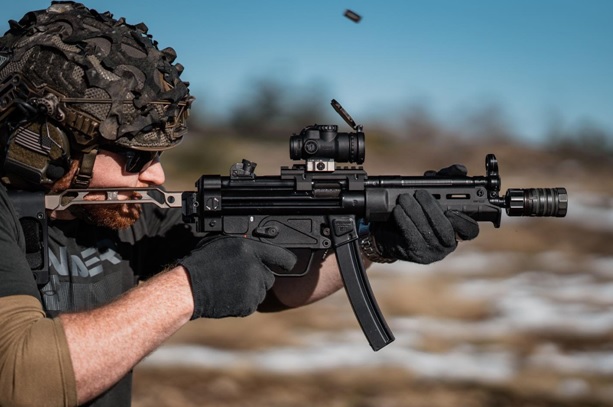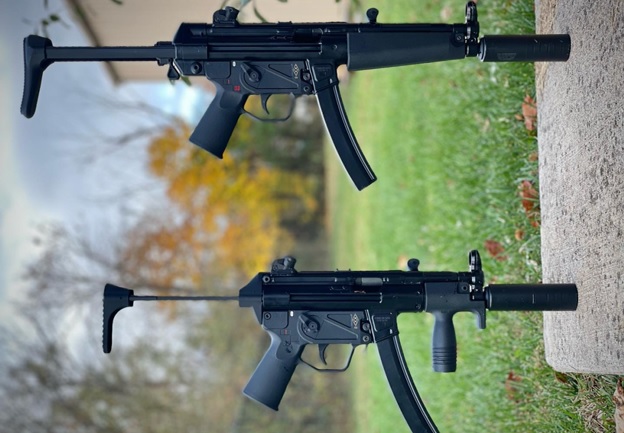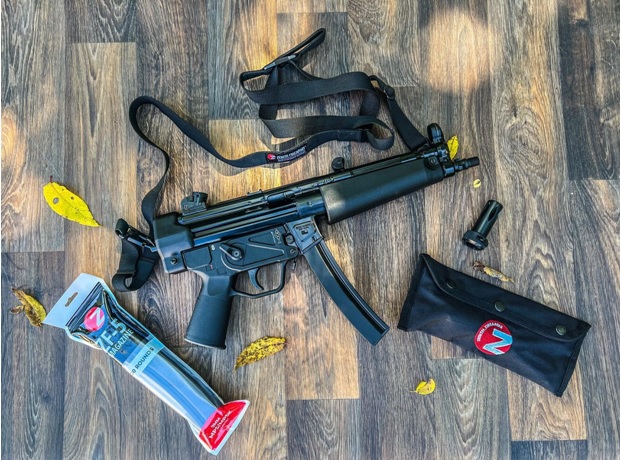When it comes to details, we here at Zenith Firearms like to think we strike the perfect balance of capturing them accurately without getting lost in them. We can still “see the forest for the trees,” that is.
This commitment to the little details is how we produced the ZF-5, an American-made MP5 that is accurate in the most minute of ways – even capturing details that you can’t see without disassembling the platform.
So let’s take a look at how some of our American-made MP5 parts capture the spirit of the original, and where we’ve made slight improvements.
The Fluted Chamber
Here’s a little tidbit you might not know if you’re not familiar with the MP5 itself: it has a fluted chamber.
That’s the sort of thing we could probably have gotten away with leaving out. But we didn’t. Our ZF-5, like the MP5, has a fluted chamber.
But why jump through hoops (not to mention extra work) to produce an American-made MP5 that has basically the exact same chamber configuration as the real thing?
Well, because it’s not cosmetic. It makes a difference, even if you never noticed it before.
There are a few big reasons that the fluted chamber of the ZF-5 improves the design (just as they do in the MP5). One is that it slightly lessens weight (although this is minimal). Another is that the fluted chamber increases the barrel’s inner surface area, making it less susceptible to overheating.
But the best reason of all is that, upon firing, the gas produced in the chamber is allowed to flow partially around the sides of the cartridge in the chamber; this helps prevent it from being pressed against the chamber walls, which can cause sticking and extraction issues.

Think of it like a sort of “lubrication” that aids in extraction, helps prevent jams, and makes an already-smooth shooting platform even smoother.
Feeding Hollow Points
One thing about the MP5 is that it’s really not good with hollow points. It has a hard time feeding them, which is allegedly one of the big reasons that they switched from using stick magazines to curved magazines.
This is due partially to the fact that the MP5 lacks a true feed ramp; the path that the bullet follows from the magazine to the chamber is more like a sharp step than a gradual, linear ramp. This is no problem with jacketed bullets but can cause jams with hollow points.
This is a bit of an odd feature for a subgun to have. It’s understandable why tactical use would warrant the superior penetration of jacketed bullets; but the inability to feed hollow points, which deliver impressively higher stopping power at shorter ranges, almost seems like an oversight.
Meaning, if you run one of these guns for any sort of defensive application, you’d at least want the ability to feed hollow points.
Fortunately, and notwithstanding this potential shortcoming of the MP5, our ZF-5 has no trouble feeding them. At least according to what we’ve heard from our customers and reviewers.
So think of that as a sort of improvement over the original, if you will.
The Fire Selector Switch
As much of a cult following as the HK MP5 has developed over the years, if there’s one thing that users have had their gripes over, and which has generated more or less universal criticism, it’s probably the fire selector switch.
Categorically, the fire selector switch works. It does what it’s supposed to do; it just doesn’t do it that well.
Ergonomics and placement are the issues here. The MP5’s selector switch is too far forward on the side of the platform to engage without breaking your grip, which is no problem when plinking, but problematic in competition or defensive situations (such as if you wanted to switch from safe to semi).
There are even some comments floating around out there that the MP5 requires two hands to change fire. Whether or not that is a sure problem is an issue for you to determine, if you ever get the chance.
For our part, we developed the ZF-5 with a much more ergonomic fire selector switch that is also more enjoyable to use.
The Iconic Roller-Delayed Blowback Action
It would have been easy enough to make an MP5 lookalike with a direct blowback or even recoil-operated action that would, from afar, look identical. But that wouldn’t be an MP5. We were going for the “real deal” as much as possible.
This action’s operation is associated with numerous benefits. The bolt assembly itself is lighter, and the operation of the action forces the bolt rearward at much lower velocities than direct blowback actions. Consequently, recoil is lessened to the point that it is near-nonexistent (especially with a light-kicking round like 9mm).
This cuts felt recoil dramatically and also minimizes muzzle jump, which can enable faster, more accurate follow-up shots. This system also allows chamber pressure to come down slightly before the action opens; there’s less port pop (a big issue with direct blowback actions) and muzzle blast, here, too.
One more advantage of the authentic roller-delayed blowback action is the fact that it can run a suppressor with much greater facility than direct blowback or recoil-operated actions.
In a nutshell, the roller-delay blowback creates a smooth-shooting platform, which is exactly what the MP5 is, which is exactly why we preserved this important mechanical detail.

Looking for ZF-5 Parts That Also Work as MP5 Parts?
These are only a few of the details we preserved from the original MP5 in our ZF-5, not to mention in our ZF-5 parts and accessories like magazines, barrels, and internal hardware, most of which are also compatible with the MP5, too.
If you’re looking for MP5 parts and accessories, including trigger groups, rail assemblies, MP5 A3 stocks, quality carrying cases, and cleaning kits, we have them.
Check them here first. Our ZF-5 and MP5 parts exhibit high-quality construction from premium raw materials and in many cases are finished with FNC treatments that fight wear and corrosion.
If you have any questions about any of them, get in touch with us at [email protected].

If you are using hollow points, may I suggest Hornady? They seem to be the most reliable with the ogive they use in their hollow points. That includes the older XTPs which have been tried and true for great feeding as well as great accuracy.